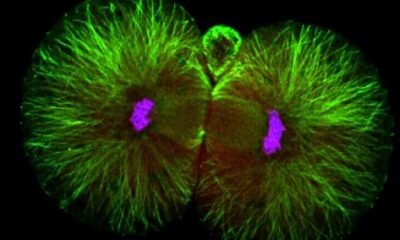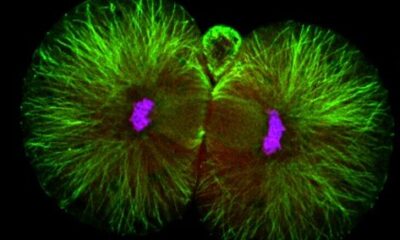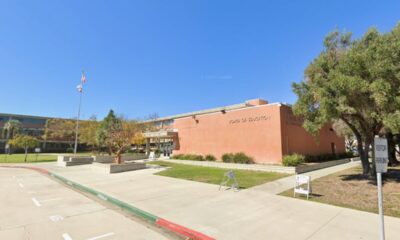Education
Mansi Kasliwal Appointed First Female Director of Palomar Observatory

Astrophysicist Mansi Kasliwal has made history by becoming the first woman to lead the renowned Palomar Observatory. The California Institute of Technology announced her appointment on September 26, 2023, marking a significant milestone for both Kasliwal and the facility located in San Diego County.
Kasliwal’s connection to Palomar Observatory is deeply personal. She first visited the site as a graduate student pursuing her doctorate in astrophysics, where she states she learned the “ABC’s of astronomy.” Reflecting on her journey, Kasliwal remarked, “In many ways, I learned my ABC’s of astronomy at Palomar. So, my roots in astronomy are very closely connected to Palomar. I consider it my second home, my professional home.”
Her research has focused primarily on the discovery of new stars and cosmic events, which she refers to as “cosmic fireworks.” These phenomena resemble terrestrial fireworks and are crucial for understanding the origin of elements found in the universe. Utilizing the observatory’s three active research telescopes, including the celebrated 200-inch Hale Telescope, Kasliwal leads her team in studying these celestial events.
“The fundamental question we’re trying to answer with this study is: where do the elements that you and I are made up of come from? How are they actually synthesized?” she explained. “Many of these elements are synthesized in these fleeting moments, which are cosmic fireworks, and you can see them in the act of being formed when you discover and characterize them.”
Kasliwal’s contributions to astrophysics are extensive. With over 480 published articles, she received the New Horizons in Physics Prize in 2022 for her pioneering work in electromagnetic observations of gravitational wave sources. This accolade reflects her leadership in extracting significant information from the first observed collision of two neutron stars, as noted by the Breakthrough Prize.
The Palomar Observatory, which celebrates its 77th anniversary this year, has long been a cornerstone of astronomical research. It has fostered numerous domestic and international collaborations, including partnerships with the Jet Propulsion Laboratory in Pasadena. Kasliwal noted that the observatory serves as an excellent training ground for graduate students and postdoctoral fellows, some of whom have gone on to receive Nobel Prizes after completing their research at Palomar.
“My experience mentoring students whose PhD theses were at Palomar and mentoring postdoctoral fellows has been incredibly rewarding,” Kasliwal said. “This is a great opportunity to more officially lead the scientific and strategic charge for the observatory.”
Kasliwal’s tenure comes during a challenging period for research funding. The administration of former President Donald Trump significantly reduced federal grants for various research initiatives, citing inefficiencies in science spending. This shift has resulted in the termination of numerous ongoing research grants, impacting institutions nationwide.
In light of these challenges, Kasliwal expressed optimism about the observatory’s future. “It is indeed turbulent times navigating the federal funding landscape. But that said, I think the work that is done at Palomar Observatory has been very generously and kindly supported by philanthropists and private foundations,” she stated. “We are hopeful that the combination of some continued federal funding, but also philanthropy, private foundations, and worldwide partnerships will help us steer through the turbulence.”
As the new director, Kasliwal aims to maintain the observatory’s scientific vibrancy and lead it at the forefront of astrophysical research. Her priorities include supporting the staff and integrating emerging technologies into the observatory’s operations.
“It’s now a little bit more on me to make sure [the staff] are also happy and love what they do,” Kasliwal remarked. “And to embrace new technologies, both hardware technologies and software technologies, to really apply that to astrophysics, so that we can unlock the mysteries of the dynamic universe.”
The Palomar Observatory remains open to the public, offering a museum and guided tours of its facilities. More information can be found on its official website.
-

 Technology5 months ago
Technology5 months agoDiscover the Top 10 Calorie Counting Apps of 2025
-

 Health3 months ago
Health3 months agoBella Hadid Shares Health Update After Treatment for Lyme Disease
-

 Health3 months ago
Health3 months agoErin Bates Shares Recovery Update Following Sepsis Complications
-

 Technology4 months ago
Technology4 months agoDiscover How to Reverse Image Search Using ChatGPT Effortlessly
-

 Technology1 month ago
Technology1 month agoDiscover 2025’s Top GPUs for Exceptional 4K Gaming Performance
-

 Technology3 months ago
Technology3 months agoElectric Moto Influencer Surronster Arrested in Tijuana
-

 Technology5 months ago
Technology5 months agoMeta Initiates $60B AI Data Center Expansion, Starting in Ohio
-

 Technology5 months ago
Technology5 months agoRecovering a Suspended TikTok Account: A Step-by-Step Guide
-

 Health4 months ago
Health4 months agoTested: Rab Firewall Mountain Jacket Survives Harsh Conditions
-

 Lifestyle5 months ago
Lifestyle5 months agoBelton Family Reunites After Daughter Survives Hill Country Floods
-

 Health3 months ago
Health3 months agoAnalysts Project Stronger Growth for Apple’s iPhone 17 Lineup
-

 Technology4 months ago
Technology4 months agoHarmonic Launches AI Chatbot App to Transform Mathematical Reasoning





















